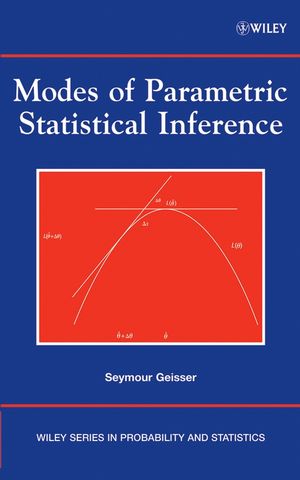Modes of Parametric Statistical InferenceISBN: 978-0-471-66726-1
Hardcover
192 pages
January 2006
 This is a Print-on-Demand title. It will be printed specifically to fill your order. Please allow an additional 10-15 days delivery time. The book is not returnable.
|
||||||
A fascinating investigation into the foundations of statistical
inference
This publication examines the distinct philosophical foundations of different statistical modes of parametric inference. Unlike many other texts that focus on methodology and applications, this book focuses on a rather unique combination of theoretical and foundational aspects that underlie the field of statistical inference. Readers gain a deeper understanding of the evolution and underlying logic of each mode as well as each mode's strengths and weaknesses.
The book begins with fascinating highlights from the history of statistical inference. Readers are given historical examples of statistical reasoning used to address practical problems that arose throughout the centuries. Next, the book goes on to scrutinize four major modes of statistical inference:
* Frequentist
* Likelihood
* Fiducial
* Bayesian
The author provides readers with specific examples and counterexamples of situations and datasets where the modes yield both similar and dissimilar results, including a violation of the likelihood principle in which Bayesian and likelihood methods differ from frequentist methods. Each example is followed by a detailed discussion of why the results may have varied from one mode to another, helping the reader to gain a greater understanding of each mode and how it works. Moreover, the author provides considerable mathematical detail on certain points to highlight key aspects of theoretical development.
The author's writing style and use of examples make the text clear and engaging. This book is fundamental reading for graduate-level students in statistics as well as anyone with an interest in the foundations of statistics and the principles underlying statistical inference, including students in mathematics and the philosophy of science. Readers with a background in theoretical statistics will find the text both accessible and absorbing.
This publication examines the distinct philosophical foundations of different statistical modes of parametric inference. Unlike many other texts that focus on methodology and applications, this book focuses on a rather unique combination of theoretical and foundational aspects that underlie the field of statistical inference. Readers gain a deeper understanding of the evolution and underlying logic of each mode as well as each mode's strengths and weaknesses.
The book begins with fascinating highlights from the history of statistical inference. Readers are given historical examples of statistical reasoning used to address practical problems that arose throughout the centuries. Next, the book goes on to scrutinize four major modes of statistical inference:
* Frequentist
* Likelihood
* Fiducial
* Bayesian
The author provides readers with specific examples and counterexamples of situations and datasets where the modes yield both similar and dissimilar results, including a violation of the likelihood principle in which Bayesian and likelihood methods differ from frequentist methods. Each example is followed by a detailed discussion of why the results may have varied from one mode to another, helping the reader to gain a greater understanding of each mode and how it works. Moreover, the author provides considerable mathematical detail on certain points to highlight key aspects of theoretical development.
The author's writing style and use of examples make the text clear and engaging. This book is fundamental reading for graduate-level students in statistics as well as anyone with an interest in the foundations of statistics and the principles underlying statistical inference, including students in mathematics and the philosophy of science. Readers with a background in theoretical statistics will find the text both accessible and absorbing.



